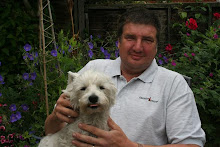Henry and Min were as good as gold (those are the Goon Show names we have given them inspired by them looking to me like the old folks on the road sign walking hunched forward as they do, and being (by all accounts) rather dim). They quietly and calmly explored the yard, the chicken and goose houses, the cattle race and then out towards the Secret Garden and the big pond. They creep about rather tentatively muttering high pitched 'chat chat' clucks to each other. They met some Hubbards first and were confident and unperturbed. When a Hubbard 'roo' decided to square up to one of the Guineas, the Guinea squared up right back at him and he backed down in a hurry. I watched them for the first hour and then went about my business, calling back to check on them during the day.
 |
| The Guineas claim the centre of the scattered seed. |
 |
| 600 g parsnip. |
The Jerusalem Artichokes have also done remarkably well. Their 8 foot tops looking like sunflower plants have now started to die back and go black with the frost but the soil is so loamy and crumbly that you can harvest the chokes just by pulling up the main stem. This bowl with its 2.1 kg of chokes comes from a single plant. These are, if my plans are to be believed, the old fashioned knobbly variety, though they look as smooth, swollen and clean as any I have seen. We have also grown a ridge of the modern 'Fuseau' variety which purport to be less knobbly. It is possible that I have cross labelled (though I doubt it) so it will be interesting to dig some of those and see what shape they are. Liz has been surfing the net for interesting artichoke recipes and I think we have something along those lines on the menu for tonight. I will let you know how we got on.
Finally, Joy of Joys, I found in the bottom of a drawer an old English tin of that elixir of boot cleaning potions, Kiwi "Dubbin". This stuff is brilliant for keeping work boots and hiking boots waterproof and the leather supple but try as I might, I have been unable to find it for sale in Ireland. I have been smearing my boots with goose grease which kinda works but is a bit messy and does not seem to stay put very long. Now, though, all is well with the world. The tin did not have much in, just enough for half a dozen 'goes' maybe, but for today my boots are clean, dry and with that lustre that neutral Dubbin lends to them. I am a happy 'stockman' clomping about after Henry and Min.






1 comment:
Try the shoe repair man in Roscommon I will be surprised if he doesn't have it, I'm sure I saw a pair of riding boots last time we were in there and riders must be able to get dubbing somewhere.
Post a Comment